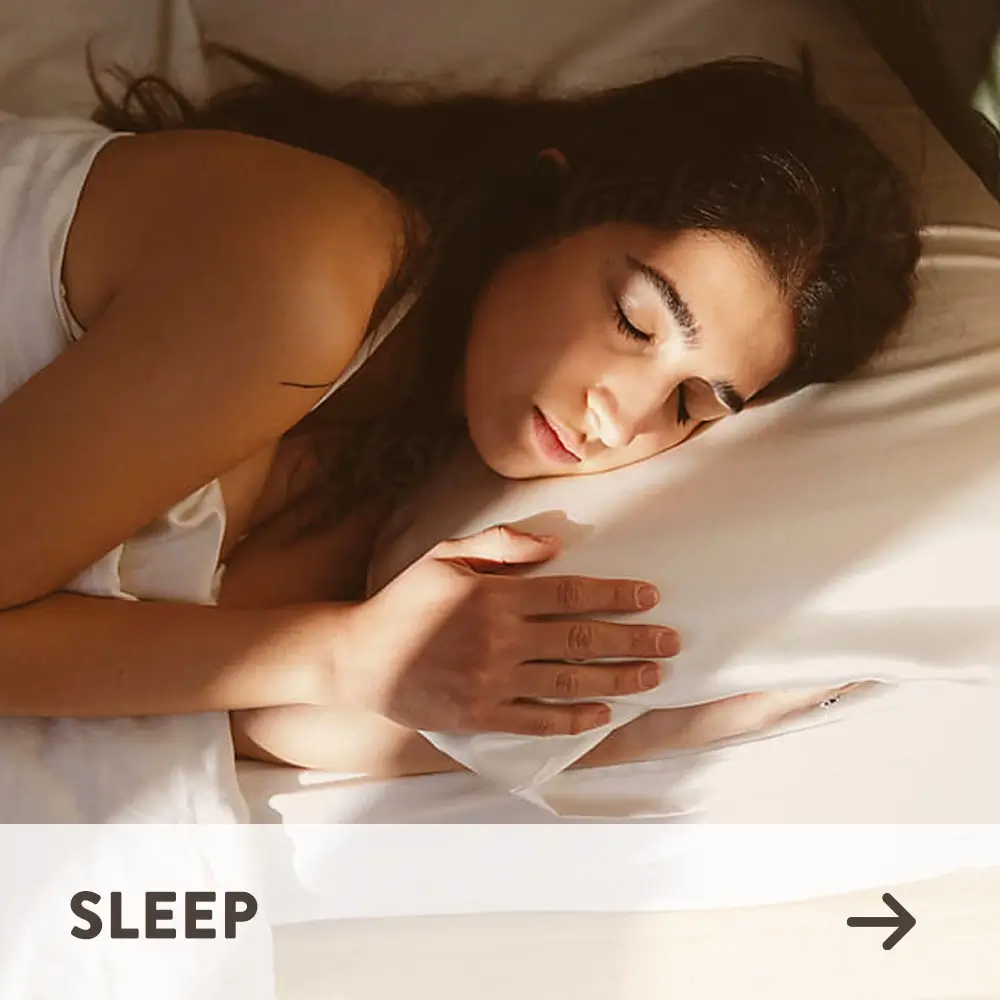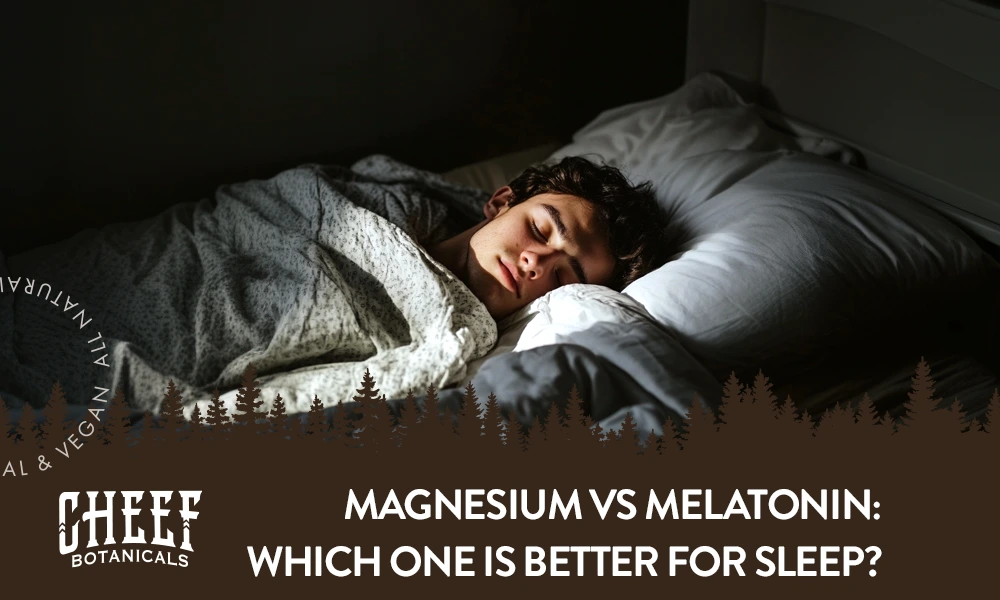Magnesium vs melatonin. Both are popular sleep aids, but which one actually works better? If you’ve ever struggled with falling asleep or staying asleep, you’ve probably come across these two options. Melatonin supplements aim to help regulate the sleep-wake cycle, while magnesium supplements aim to support the nervous system and promote restful sleep. But does one give you better sleep quality than the other?
The answer isn’t one-size-fits-all. Some people need help resetting their circadian rhythm, while others may have a magnesium deficiency affecting their sleep. Understanding how magnesium and melatonin work may help you decide which is best for you. Read on to learn which one fits your sleep needs.
What is Magnesium?
The body relies on magnesium for various processes, from muscle function to maintaining better sleep quality. It helps regulate the nervous system, supports muscle relaxation, and plays a role in melatonin production. Since the body doesn’t produce magnesium on its own, it must come from magnesium-rich foods like whole grains, nuts, and leafy greens or through magnesium supplements.
If you do not consume enough magnesium, you may develop a magnesium deficiency. This type of deficiency can lead to restlessness, muscle cramps, and trouble getting a good night’s sleep. Many people turn to magnesium supplementation to promote restful sleep and improve their circadian rhythm. Certain types, like magnesium glycinate and magnesium citrate, are especially popular for better sleep.
What is Melatonin?

The pineal gland produces melatonin, a natural hormone that keeps your sleep schedule on track. As it gets dark, the body increases melatonin production, signaling that it’s time to sleep. But factors like screen time, bright lights, stress, and poor sleep schedules can throw off this process, leading to sleep disturbances.
This is where melatonin supplements come in. They may help balance the body’s circadian rhythm and support falling asleep. While melatonin is a popular sleep aid, excessive amounts may cause grogginess or interfere with your sleep-wake cycle. That’s why finding the right amount is key to achieving more restful sleep.
Magnesium vs Melatonin for Sleep: How Do They Work?
Both magnesium and melatonin play a role in sleep, but they work in different ways. Melatonin supplements act as a signal to the body, telling it when it’s time to sleep. They may help regulate the sleep-wake cycle and are often used to calm insomnia or adjust to new time zones.
Magnesium supplementation, on the other hand, helps the body relax by calming the nervous system and promoting relaxation by helping the body respond to stress more effectively. This makes it easier to unwind and achieve better sleep quality naturally. While both magnesium and melatonin may promote natural sleep, their effects depend on what’s causing the sleep issues in the first place.
How Melatonin Promotes Sleep
Melatonin works by syncing the body’s circadian rhythm with the natural day-night cycle. As light fades, the pineal gland releases more melatonin, making you feel sleepy. But if your body isn’t producing enough, melatonin supplements may help fill the gap.
That’s why people struggling with jet lag or irregular work hours often turn to melatonin for support. It doesn’t act as a sedative but instead helps induce sleep by signaling that it’s bedtime. However, taking too much melatonin can interfere with the body’s natural sleep process, leading to drowsiness or changes in sleep patterns.
How Magnesium Promotes Sleep
Magnesium plays a big role in sleep science by supporting the nervous system and muscle relaxation. It helps regulate melatonin production, which is why magnesium intake is often linked to better sleep quality. People with low magnesium levels may experience sleep disturbances, making it harder to stay asleep.
Certain forms, like magnesium glycinate and magnesium citrate, are known to promote restful sleep. These supplements may help ease muscle cramps and calm the central nervous system, allowing the body to fully relax. This makes taking magnesium supplements a popular option for those looking to enhance sleep duration, comfort, and overall sleep efficiency.
Is Magnesium or Melatonin Better for Sleep?
Magnesium vs melatonin—which one actually works better? It depends on what’s keeping you up at night. Melatonin supplements may help reset the sleep-wake cycle, making them useful for jet lag or irregular sleep schedules. Magnesium supplements, on the other hand, may help the body relax by calming the nervous system and relaxing the muscles.
If falling asleep is the issue, melatonin might be the better choice. But if you’re waking up in the middle of the night or feeling restless, taking magnesium supplements could help. Understanding the root of your sleep problems makes it easier to choose the right sleep aid.
Can You Take Magnesium and Melatonin Together?
Yes, you can take magnesium and melatonin together, and they may even work better as a team. Magnesium aims to help the body relax, while melatonin signals to the brain it’s time to sleep. That means this combo may help with both falling asleep and staying asleep.
Research suggests that pairing these two may support better sleep quality, especially for those dealing with sleep issues. But balance is key—too much magnesium can cause stomach discomfort, and too much melatonin may make you groggy the next day. Choosing the right amount of dietary supplements, like magnesium glycinate or magnesium citrate, may help promote restful sleep without unwanted side effects.
Benefits of Magnesium for Relaxation and Rest
Magnesium helps the body unwind, making it a solid choice for improving sleep quality. It works by calming the nervous system and relaxing the muscles, which may help promote deeper, more restful sleep.
- Relaxes the Nervous System. Magnesium may help regulate stress hormone levels, which allows the nervous system to shift into a relaxed state. With consumption, you may sleep quickly and stay asleep without disruptions.
- Eases Muscle Tension and Cramps. Magnesium supplementation may also help with muscle cramps and soreness, which are common causes of sleep disturbances. Relaxed muscles contribute to a good night’s sleep.
- Supports Natural Melatonin Production. Magnesium plays a role in the body’s natural melatonin production, which helps maintain a healthy sleep cycle. A steady circadian rhythm makes it easier to maintain a regular sleep schedule.
Benefits of Melatonin for Regulating Sleep Cycles
Melatonin is the body’s natural signal for sleep, helping to regulate the sleep-wake cycle. Keeping melatonin in check potentially makes it easier to enjoy deep sleep and start the day feeling fully refreshed.
- Helps Balance the Circadian Rhythm. Melatonin works by aligning the body’s circadian rhythm with natural light patterns. This is especially useful for people dealing with sleep issues from jet lag or shift work.
- Supports Falling Asleep Faster. Low melatonin production can make falling asleep harder. Melatonin supplements help boost levels at bedtime, making it easier to drift off.
- Improves Sleep Efficiency. Studies show that melatonin can help people achieve more restful sleep by increasing REM sleep. This may lead to a higher-quality sleep duration and better overall sleep health.
Featured Products: Cheef Botanicals Sleep Gummies [Contains Melatonin]

Struggling with sleep issues? Sometimes, melatonin alone isn’t enough. Cheef Botanicals’ Sleep Gummies take things up a notch by pairing hemp-derived cannabinoids with melatonin supplements for powerful sleep support. These aren’t your average sleep aid—they’re designed to help you relax, ease stress, and promote quality rest.
- Melatonin + CBD Sleep Gummies. Looking for a chill way to relax before bed? These gummies combine CBD and CBN to help promote calmness and comfort, while the melatonin aims to support a steady sleep cycle. Just take some before bed and let the blend work its magic. Wake up refreshed and not groggy.
- Melatonin + THC Sleep Gummies. Looking for something stronger? These D9 THC + CBN gummies take relaxation to another level. The combination of THC, CBN, and melatonin may help with both falling asleep and staying asleep. Plus, they taste great. Take one, get cozy, and let yourself drift into natural sleep.
Are There Any Other Natural Alternatives to Support Restful Sleep?
Melatonin and magnesium supplements aren’t the only ways to improve sleep quality. Plenty of natural options can help the body relax and reset the sleep-wake cycle without relying on synthetic sleep aids.
- CBD and THC. These natural compounds support the Endocannabinoid system (ECS), helping to calm the mind and encourage relaxation.
- Chamomile. A classic herbal remedy known for its soothing effects. Chamomile contains antioxidants that may support better sleep quality by promoting a sense of calm before bed.
- Lavender. Used in aromatherapy, teas, and supplements, lavender has been linked to improved sleep patterns. Its calming scent may help ease sleep disturbances and support the body’s circadian rhythm.
Potential Side Effects and Considerations of Melatonin and Magnesium
While melatonin supplements and magnesium supplementation can be great for sleep issues, taking too much can lead to unwanted effects. It’s all about balance.
- Too much melatonin. A higher dose doesn’t always mean better sleep. Excess melatonin can mess with your natural sleep pattern, making mornings feel rough instead of refreshing. Some may also experience grogginess or mild headaches.
- Too much magnesium. High doses, especially from magnesium oxide, can lead to uncomfortable sensations like digestive upset. Gentler forms, like magnesium glycinate, might be better for sleep, health, and relaxation.
- Finding the right dose. Everyone reacts differently. The key is to start small, pay attention to your body, and choose high-quality dietary supplements for better sleep efficiency.
Choosing the Best Option for Your Sleep Needs
Figuring out what works best for your sleep largely depends on what’s causing the problem. If falling asleep is a struggle, melatonin supplements may help reset your sleep-wake cycle. If restlessness or muscle aches are keeping you up, taking magnesium supplements like magnesium glycinate may be the better choice.
For an even stronger effect, Cheef Botanicals’ Melatonin Sleep Gummies combine CBD or THC, and melatonin to support deep, natural sleep. This formula may help you relax, fall asleep, and wake up refreshed. If you’re looking for an easy, all-natural way to enhance sleep quality, these gummies are a great choice.
Final Thoughts on Magnesium vs Melatonin
Magnesium and melatonin may both support better sleep but in different ways. Magnesium supplementation helps the body relax, while melatonin production helps to keep the circadian rhythm in check. Which one is best depends on what or how your rest is interrupted.
For next-level sleep options, Cheef Botanicals’ Melatonin Sleep Gummies blend hemp-derived cannabinoids with melatonin for strong, long-lasting effects. These gummies go beyond traditional sleep aids, helping to reset the body’s natural sleep process while keeping you relaxed through the night.
At the end of the day, better sleep starts with understanding what your body needs. A consistent sleep schedule, a relaxing routine, and the right sleep supplement can make all the difference.
 35% Off Code: Memorial35
35% Off Code: Memorial35

 Sale
Sale 
























